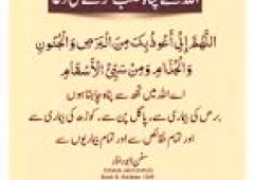Wailing refers to mourning in a loud voice and crying in a high pitch, which was prohibited by the Prophet, peace be upon him. Abu Malik al-Ash’ari reported that the Prophet, peace be upon him, said: “Four practices of the pre-Islamic days of Ignorance will continue to be practiced by my ummah: taking pride in one’s parentage, giving a person a father other than his own genealogical father, believing that rain is caused by some stars, and wailing over the dead.” He further said: “A (professional) mourner, unless she repents before her death, will be raised on the Day of Judgment wearing a garment of tar and an armor of blistering puss.” This is narrated by Ahmad and Muslim. Umm ‘Atiyyah reports: “The Messenger of Allah made us pledge that we will not wail over (the dead)” (Bukhari and Muslim). Al-Bazzar has transmitted, through a sound chain of authorities the report that the Prophet, peace be upon him, said: “Two sounds are accursed in this world and in the hereafter: the sound of wind instruments (to celebrate) good fortune, and of moaning aloud when afflicted with a misfortune.” Abu Musa is reported to have said: ‘I declare my disavowal of all that Allah’s Messenger disavowed. The Messenger of Allah disavowed publically a woman who mourns loudly, one who shaves her head, and one who tears her clothes in mourning” (Bukhari and Muslim). Ahmad narrates from Anas that he said: “The Prophet, peace be upon him, made the women pledge, while giving their allegiance to him, not to mourn loudly for the dead. Thereupon they asked him, ‘O Messenger of Allah, some women helped us (in mourning our dead) during the pre-Islamic days. Should we (also in return) help them (in mourning their dead) now that we are Muslims? ‘ He replied: ‘There is no such thing in Islam (i. e., helping each other to mourn the dead loudly)’.”
Mourning for a Deceased
It is permissible for a woman to mourn for a period of three days on the death of a near relative, provided that her husband does not object to her doing so. It is not permissible for her to mourn for more than three days, except in the case of her husband’s death, when she is to mourn for four months and ten days, which is a legally prescribed period of waiting or “Iddah”. This is reported by the group, (The compilers of the six most reliable hadith books generally known as Sihah Sitta) except Tirmizhi. They report from Umm ‘Atiyyah, that the Messenger of Allah said: “A woman should not mourn for any deceased person for more than three days, except in the case of her husband’s death, which she may mourn for a period of four months and ten days. Such a woman (in mourning) is not to wear any (brightly) colored dress. She may wear only plain dress. During this period she should not use any adornment or eye makeup, nor wear any perfume, nor dye her hands and feet with henna, nor comb her hair, except at the end of her menstruation period, when she may use some cleaning or refreshing agents (such as perfume, etc. ) to get rid of any offensive smell left over from her period.” Accordingly, when a widow mourns, she must not use any adornment, such as jewelry, kohl, 58 silk, perfume, or henna dye on her hands and feet. A widow must observe this waiting period in deference to her late husband’s memory and to fulfill her obligations toward him.
Preparing Food for the Bereaved Family is Encouraged
Abdullah ibn Ja’far reported that the Messenger of Allah, peace be upon him, said: “Prepare some food for the family of Ja’far, for what has befallen them is keeping them preoccupied.” This is narrated by Abu Daw’ud, Ibn Majah and Tirmizhi, who grades it as a sound hadith. The Prophet, peace be upon him, recommended this practice for it is an act of virtue and kindness and brings friends and neighbors closer to each other. Ash-Shafi’i said: “It is recommended that the relatives of the deceased prepare enough food to feed all the deceased’s family for one day and night, for it is the Sunnah of the Prophet, peace be upon him, and a practice of good people.” The scholars hold it commendable to urge the deceased’s family to eat so that their sorrow or excessive grief will not cause them to avoid food and thereby become weak. These scholars also hold that to offer food to the women while they are mourning loudly is not permissible, for it would be helping them in something sinful. All the schools of Islamic law disapprove of the deceased’s family preparing food for the people coming to pay their condolences, for it adds to their grief and further encumbers them unnecessarily. Such a practice would also resemble the custom of the Arabs before Islam. Referring to this practice, Jarir says: “(In those days) we considered it a part of mourning to assemble at the deceased’s house and prepare food after burial for those gathered there.” Some scholars consider this to be absolutely forbidden (haram). Ibn Qudamah observes: ‘It is permissible, however, when there is genuine need for it, since sometimes people attending the funeral may be from distant places, and they have to stay with the family of the deceased, in which case the family has to host such guests.
Preparing the Kafan (Shroud) and Grave Before Death
Bukhari deals with this subject in a chapter entitled: “Those Who Prepared the Kafan in the Prophet’s Days without him objecting to it. Reporting on the authority of Sahl, Bukhari says: “A woman came to the Prophet, peace be upon him, with a woven piece of cloth that had two seams on its edges. She said: ‘I wove it with my own hands in order to wear it. ‘The Prophet, peace be upon him, took it because he needed it. He wrapped it around his waist so that it covered the lower half of his body, and he came toward us. A man praised it, saying: ‘This is a very nice cloth! Why don’t you give it to me to wear?’ Some of the people present there reproached the man for they knew that the Prophet needed that cloth and that he never denied anyone’s request. The man replied: ‘By Allah, I asked him for it not to wear it, but to save it and use it as my kafan’.” Sahl continues: “And (later when he died) that same piece of cloth was used as his kafan.” Commenting on the above chapter of Bukhari, Al-Hafiz ibn Hajar says: “Bukhari phrased it so as to show that though (initially) the companions disliked the man’s request for the cloth from the Prophet, they did not disapprove of it when he explained to them the reason for his request. This proves that it is permissible for a person to arrange during his lifetime for the things he will need after his death, such as a kafan or a grave.” He cites Ibn Battal who said it is permissible to arrange for something before it is actually needed. Furthermore Al-Hafiz observes: “Some righteous people did indeed have their graves dug and prepared for them during their lifetime.” Al-Zain ibn al-Munir criticized him, saying that the companions of the Prophet, peace be upon him, did not do so, and that if doing so (preparing one’s grave during one’s lifetime) were desirable most of them would have done so. Commenting on this Al-’Aini says: “The fact that it was not done by the companions of the Prophet does not imply that doing so is not permissible, for if an act is deemed good by Muslims, then it is also good in the sight of Allah, especially when it is practiced by some of the most pious scholars.” Ahmad said: “There is nothing wrong if a person purchases a site for his burial and makes a will to the effect that he is to be buried there. ‘Uthman, ‘Aishah, and ‘Umar ibn Abd al-’Aziz, all did so.”
To be continued





